Spotlight on the 8 writers of Here Out West
Meet the eight voices behind new anthology feature Here Out West and hear some of their takeaways.
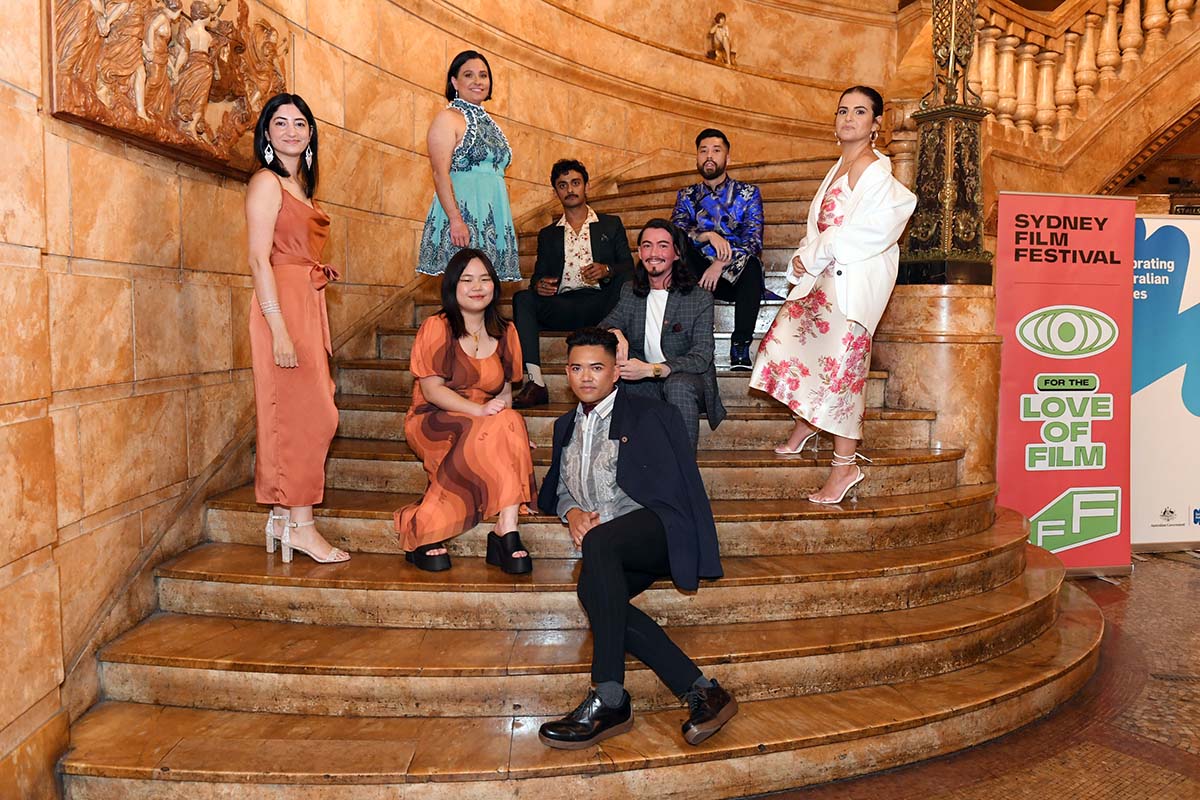 Here Out West writers at the 2021 Sydney Film Festival Opening Night (Photo credit: Sydney Film Festival)
Here Out West writers at the 2021 Sydney Film Festival Opening Night (Photo credit: Sydney Film Festival)
Australian film Here Out West features the enormous collaborative effort from a creative team made up of eight writers, five directors, three producers and three executive producers. They weaved together eight distinct story worlds (that included nine languages) into one cohesive feature, which made its World Premiere as Opening Night Film at Sydney Film Festival in 2021.
“It works,” says producer Annabel Davis, and CEO at Co-Curious. “It just strikes the right balance. There was the freedom for the writers to really explore their own stories within the parameters of the feature film that meant that we worked as a whole…
“It just speaks to the tapestry or mosaic that Western Sydney is. That's what we've replicated in this film. It’s many things, it's not one thing.”
In Here Out West, the kidnapping of a baby from a Western Sydney hospital is the catalyst for a series of poignant, interconnected stories that take place over the course of one day.
Here Out West was never originally intended to be a feature. The concept started from Co-Curious’ flagship Behind Closed Doors development program, which did a call-out for eight writers and two emerging producers from culturally and linguistically diverse backgrounds in western Sydney.
“The call out was looking for people, not ideas. We wanted the ideas to come together in the room as a group,” Davis says.
They got nearly 70 applications, which Davis adds spoke “to the enormous amount of talent, but lack of opportunities for people living in the west.”
Only eight writers could be selected though, and soon Nisrine Amine, Bina Bhattacharya, Matias Bolla, Claire Cao, Arka Das, Dee Dogan, Vonne Patiag and Tien Tran were in a three-day workshop with script producer Blake Ayshford, who partnered with Co-Curious on the project with Emerald Productions.
This was in July 2018. Before the workshop, Davis says they weren’t sure where the ideas would lead to: perhaps a web series. But on day one as the writers began brainstorming, it was clear there might be a feature in this.
“The ideas just felt really special and that it deserved scale and to find a really broad audience.”
Over the course of three intensive workshops, the writers delivered scene breakdowns and then three drafts with polishes.
Co-Curious and Emerald Productions were determined Here Out West would not only be unique and richly engaging, but ensure the chapters remained authentic. It meant the writers were included in discussions around potential directors and with heads of department. They also created a research packet that was like a ‘bible’ and spoke to everything from inspiration; tone; suggestions on casting, costume and locations; and even community leaders who might help connect the film to audiences.
“The art department printed these beautiful research packets out on massive A3 sheets,” Davis says. “They were the go-to document for everybody, and the writers were always in consultation with the directors to ensure cultural authenticity rather than handing over their story.”
It created a two-way learning environment between the eight writers and the five acclaimed female directors who came on board: Fadia Abboud, Lucy Gaffy, Julie Kalceff, Ana Kokkinos and Leah Purcell. Davis says everyone learned as much from the originators of the story worlds, as they did from the seasoned creatives around them.
“The writers all had an associate producer credit; they were on set when they could be (while filming during COVID); and they were there in the edit,” Davis says. “They were involved, all the way from concept through to marketing.”
Hear from the eight writers below about their experiences on Here Out West, which is in cinemas now.
(Writers in order of the chapters as they appear in Here Out West)
NISRINE AMINE
Writer of We, the Spiders
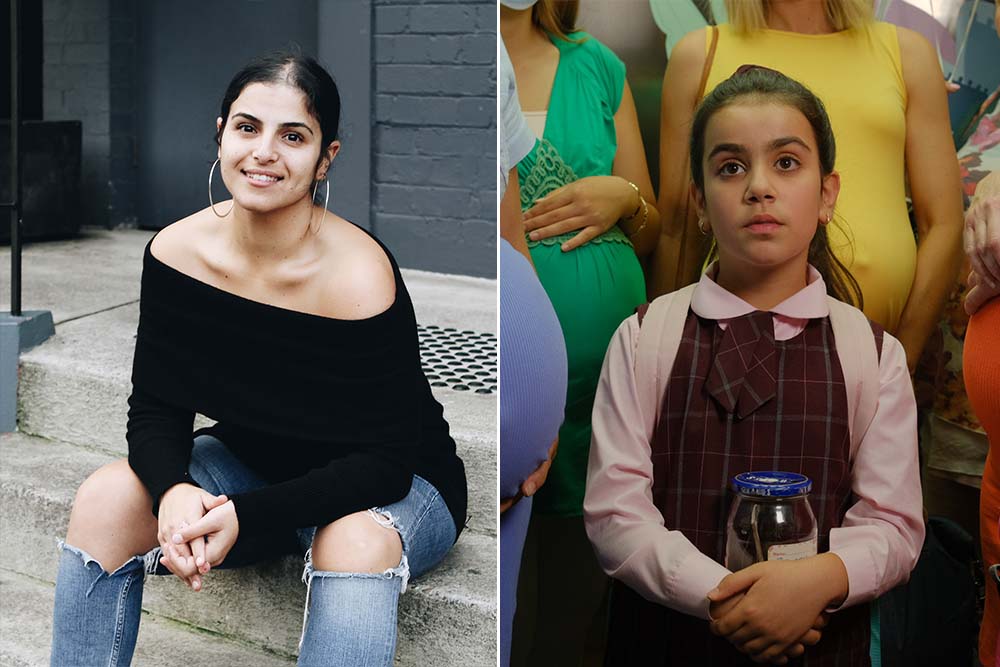 Nisrine Amine (Photo: Co-Curious), We, The Spiders (Photo credit: Tania Lambert)
Nisrine Amine (Photo: Co-Curious), We, The Spiders (Photo credit: Tania Lambert)
A Sydney-based actor, writer and teacher, Nisrine’s screen credits include Amazing Grace (Channel Nine), Mr Inbetween (FX) and feature film Slam. Her short film Apricot premiered at Flickerfest 2018 and Nisrine is also the Co-Founder and Creative Director of Parramatta Actors Centre.
What did the experience of Here Out West mean for your writing?
I learnt about efficiency in writing, about letting the visuals do the work and not heavily relying on dialogue. I learned that the first draft is never the final draft and that only after considerable script editing, and drafting and many backs-and-forths, is the script ready.
What was it like working with director Lucy Gaffy in bringing your chapter We, the Spiders to life?
Lucy Gaffy was so gentle with the work. She shared with me some personal experiences that connected her to my story, and from that, I knew that my beautiful Amirah and Nancy were in capable hands. She was considerate and transparent and made me feel part of the journey. There was nothing forceful or imposing about her process and as a result, my chapter is subtle yet extremely touching.
What’s does it mean to see your story on cinema screens?
It is surreal. I absolutely love the process and the work, but to now see the fruits of our labour… makes the work that much sweeter. I was scrolling through the session times on the Hoyts and Dendy website the other day and to see our movie in the same frame as other blockbuster movies with huge Hollywood actors… whoa… it was a moment for sure. This movie has opened so many doors for me, for us… and I can’t even imagine the possibilities to come once the world gets to see it. I am truly humbled.
MATIAS BOLLA
Writer of Everything Changes
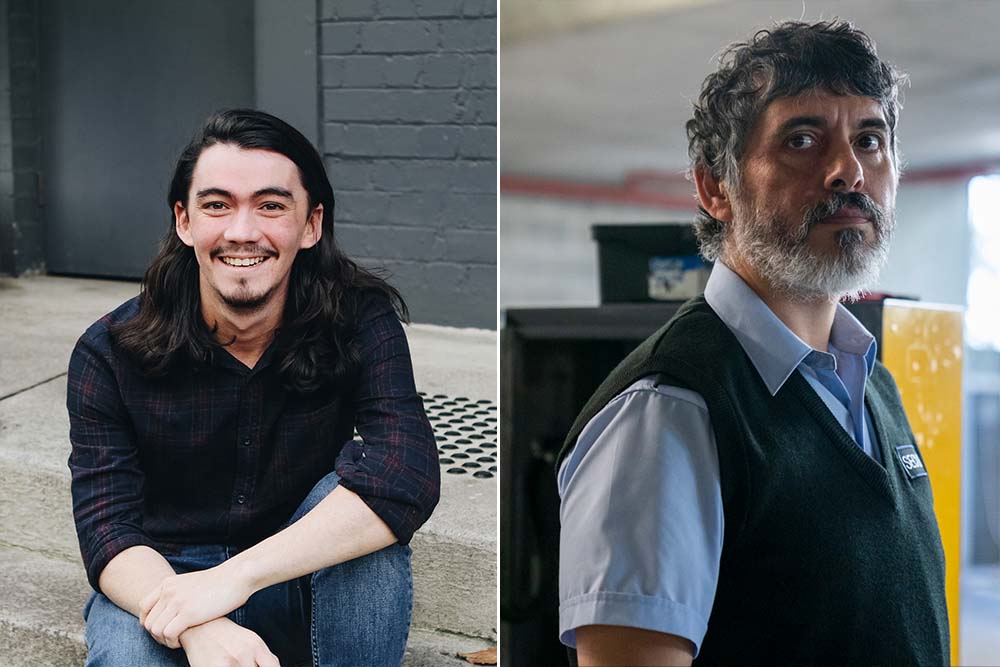 Matias Bolla (Photo: Co-Curious), Everything Changes (Photo credit: Mark Rogers)
Matias Bolla (Photo: Co-Curious), Everything Changes (Photo credit: Mark Rogers)
An Australian-Chilean director and editor, Matias works across documentary, narrative, music videos and commercials. Matias was editor on the feature documentary Wash My Soul in the River’s Flow (2021), and Assistant Editor on features Palm Beach (2019) and The Dry (2021). His documentary short Campesinos was in the official selection St Kilda Film Festival and took home prizes at festivals in Mallorca, Rome and in Australia. It was selected as a Vimeo Staff Pick in 2020.
What did the experience of Here Out West mean for your writing?
When I first joined the Behind Closed Doors program I had never been a part of a writers’ room. The experience of coming together to write in a communal space was something I instantly fell in love with. Being so new to professional screenwriting, I was also able to better understand the process of drafting and redrafting that a film of this length must go through in early development, particularly how to receive and action notes from multiple different sources. Overall my writing improved immensely as I had access to a net of support and mentors that were constantly pushing me and helping me improve.
What was it like working with Ana Kokkinos in bringing your chapter Everything Changes to life?
Working with Ana Kokkinos was one of my favourite experiences of the whole film. I particularly enjoyed the collaboration that took place in the handover stage and the care and thought that went into the smaller details of the script, especially the moments that weren’t on the page - like our deep dive into character backstory.
What’s does it mean to see your story on cinema screens?
Opening Sydney Film Festival in 2021 was a dream come true, and the whole experience of going to see our film on the big screen was genuinely a massive trip. What I found the most moving of all was hearing my language on screen for the first time in a way that was specific to Chilean-Australians. It is the language I grew up with and an honour to be able to share it with the world.
ARKA DAS
Writer of Brotherhood
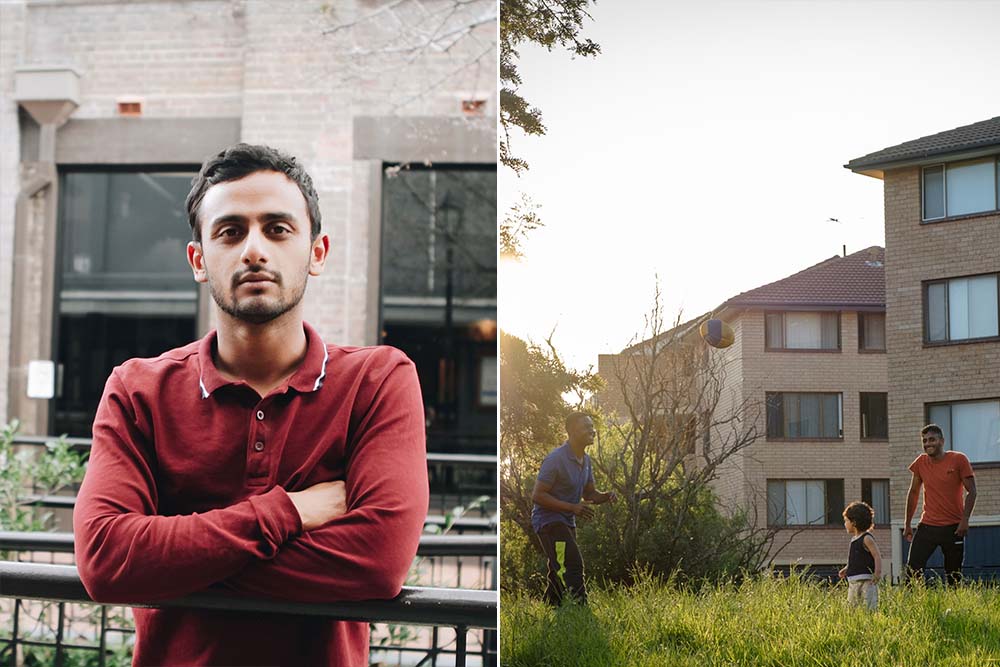 Arka Das (Photo: Co-Curious), Brotherhood (Photo credit: John Platt)
Arka Das (Photo: Co-Curious), Brotherhood (Photo credit: John Platt)
A writer and director of short films, web-series and short documentaries, Arka’s most recent short film Khana Khazana screened at film festivals in Australia including Flickerfest, St Kilda and Made in the West (where it won the jury prize for Best Film), and internationally in Los Angeles and Toronto. It is currently in development for the full-length feature film.
What did the experience of Here Out West mean for your writing?
It helped my writing immensely in that I learned how to break and develop a story in the room and collaborate with others. Also the pressure of deadlines and having to write for a bigger goal really helped sharpen my skills.
What was it like working with Leah Purcell in bringing your chapter Brotherhood to life?
Working with Leah Purcell for my Brotherhood chapter was a great experience in that even though we are so different from each other we connected through my story of young boys growing up in Western Sydney. She could relate growing up in Sydney with her brothers. I also feel like it was groundbreaking to have an Indigenous artist direct a migrant story - we should see more of this type of collaboration in the industry.
What’s does it mean to see your story on cinema screens?
It’s truly a special experience seeing characters I not only created but that were also inspired by real life come to the big screen around Australia. It is also emotional to hear my first language - Bengali - being spoken in an Australian film for the first time ever. Here Out West will always hold a special place in my heart.
BINA BHATTACHARYA
Writer of The Eternal Dance
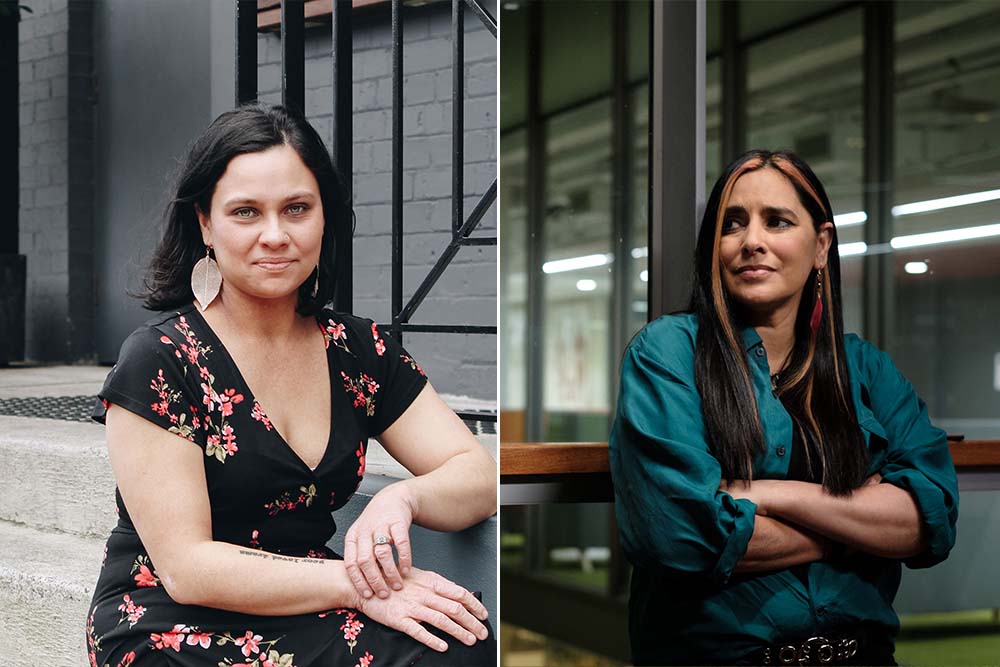 Bina Bhattacharya (Photo: Co-Curious), The Eternal Dance (Photo credit: John Platt)
Bina Bhattacharya (Photo: Co-Curious), The Eternal Dance (Photo credit: John Platt)
A writer, producer and director from Campbelltown in Sydney’s southwest, Bina’s award-winning short films include Musings and Wild Dances, with the latter screening at festivals in the USA, Ukraine, Germany, and Czech Republic as well as Mardi Gras Film Festival, Melbourne Queer Film Festival and Made in the West Film Festival. Bina runs production company Gemme de la Femme Pictures.
What did the experience of Here Out West mean for your writing?
The most noticeable improvement in my writing since working on Here Out West was my big print. I think I always wrote pretty good dialogue, but through the rewrites and the mentoring from Script Producer Blake Ayshford I learned a lot about the art of seductive, elegant big print. I've written a feature script since Here Out West and it's just so much more elevated than what I would have written three years ago. Other people familiar with my body of work notice it too!
What was it like working with Ana Kokkinos in bringing your chapter The Eternal Dance to life?
I had always been a huge fan of Ana Kokkinos' work and seen her as a role model in creating bold, provocative, fearless work. I learned a lot from watching her work with actors - just like with my big print on page, I learned by watching her that she's really succinct when she directs actors, which was important for me to observe because I have a habit of giving a billion notes and getting very academic when I speak to actors and it confuses them!
What’s does it mean to see your story on cinema screens?
I love going to the movies. It's my favourite pastime. I have so many memories of going to films by myself as a weird, film nerd teenager. My story is obviously so personal and comes from a deep well of grief surrounding my father's death and with him, ties to my Bengali heritage. I can feel the energy in the room change when everyone in that cinema starts to get a glimpse of the enormity of the feelings I've been dealing with. Every viewing is an exorcism of sorts. I'm taking my son to the movies on Thursday night when it opens and I think it will be really special for him to be with me when it comes on.
DEE DOGAN
Writer of The Musician
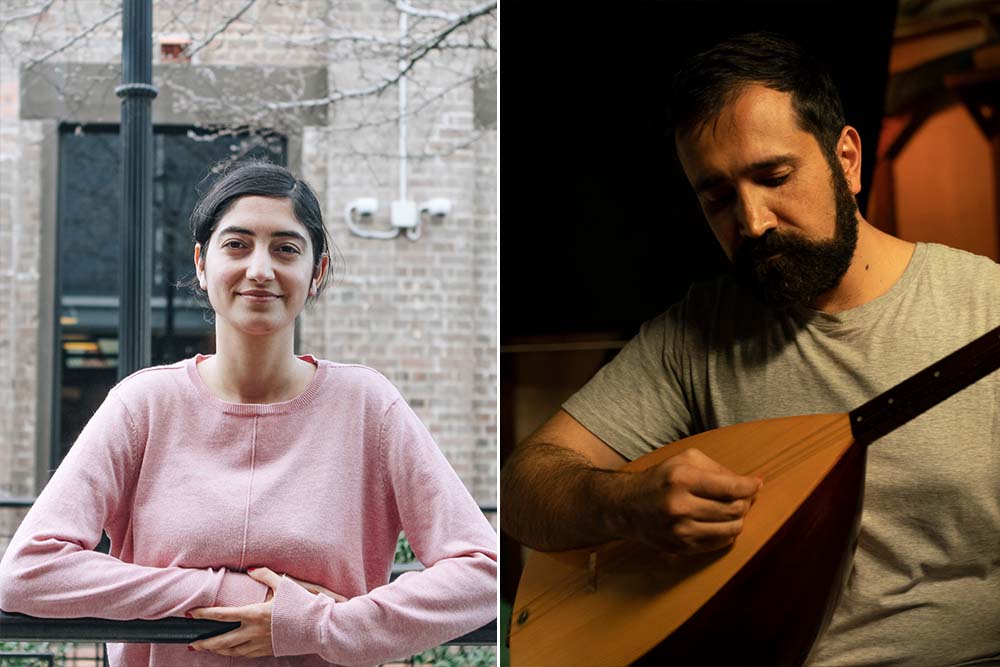 Dee Dogan (Photo: Co-Curious), The Musician (Photo credit: Mark Rogers)
Dee Dogan (Photo: Co-Curious), The Musician (Photo credit: Mark Rogers)
A Kurdish writer and director, Dee works across narrative fiction and documentary. Dee’s debut short A Loss was accepted into the Short Film Corner at 69th Cannes Film Festival in 2016. Dee is developing her debut feature A Cup of Tea produced by John Maynard (Jirga) and Bridget Ikin (Sherpa) of Felix Media, and is also developing the short Lullaby with producer Bethany Bruce.
What did the experience of Here Out West mean for your writing?
As a writer, I learned a lot of new techniques working in a team with seven other writers. It was a great collaborative experience on ideas, structure and characters. The experience was truly immersive.
What was it like working with directors Ana Kokkinos and Fadia Abboud in bringing your chapter The Musician to life?
Ana Kokkinos and Fadia Abboud did incredible work on The Musician. They have truly invested in the world of my characters and bought those moments to life. It was a lifetime experience working with them professionally.
What does it mean to see your story on cinema screens?
It’s just incredible to see the story you have been working on for years screen at your local cinemas. I hope the audience enjoys the film as much as we do.
TIEN TRAN
Writer of Brother Tom
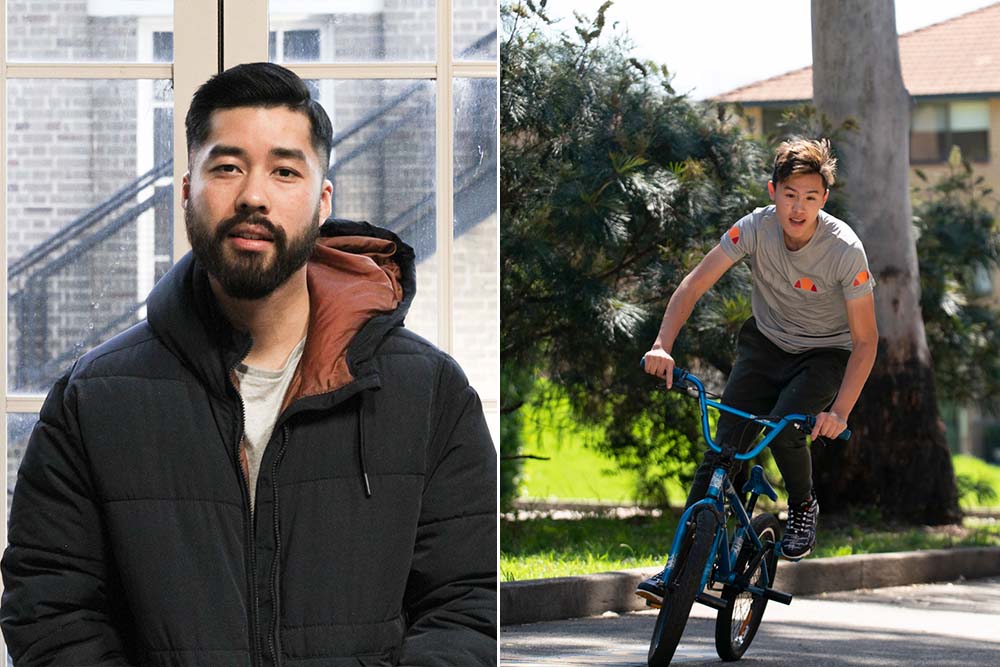 Tien Tran (Photo: Co-Curious), Brother Tom (Photo credit: Mark Rogers)
Tien Tran (Photo: Co-Curious), Brother Tom (Photo credit: Mark Rogers)
Tien Tran is a Vietnamese-Australian writer, whose work has appeared in publications including The Lifted Brow, Best Summer Stories and Peril Magazine. Originally from Perth, Tien is now based in Sydney.
What did the experience of Here Out West mean for your writing?
The collaboration between writers and producers on Here Out West taught me that half of film writing is problem solving, whether it be maintaining consistency with the story or how the big print affects the logistics of the scene. The producers providing that insight allowed us to keep our story practical for the production phase.
What was it like working with Fadia Abboud in bringing your chapter Brother Tom to life?
Fadia was great in letting me provide input during production. We spoke regularly on the phone about what props, music and wardrobe would give the most authentic feel for the chapter. It was great to see how open Fadia was to suggestions and it made me feel included in the film making process.
What’s does it mean to see your story on cinema screens?
It normalises my existence. As a kid, I could only count a handful of times where I saw an Asian character that didn't exist purely to be a punchline. Movies like that, made solely with a White gaze, should be considered science fiction because of how alien it makes you feel. Art should reflect reality in some way and the world isn't that White. To me, Here Out West is giving cinema screens that much needed colour.
VONNE PATIAG
Writer of The Long Shift
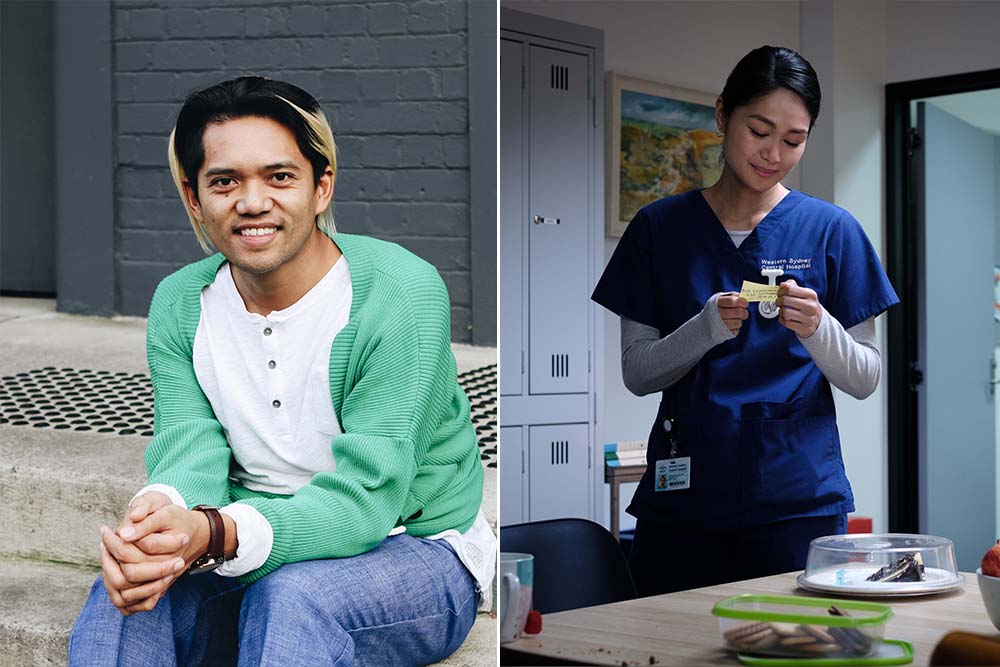 Vonne Patiag (Co-Curious), The Long Shift (Photo credit: John Platt)
Vonne Patiag (Co-Curious), The Long Shift (Photo credit: John Platt)
Vonne produced, directed and wrote inclusively alongside a team of Muslim/female writers on Halal Gurls, which released on ABC iview, and which he was nominated for an AACTA and AWGIE Award for his work on. He also co-wrote and produced on the 2021 SBS/Aquarius Films series The Unusual Suspects. His short films include Tomgirl (currently on SBS On Demand) and Window.
What did the experience of Here Out West mean for your writing?
Working on Here Out West was an incredible upskilling event for my writing and filmmaking - especially as we used the writers' room model to help craft our stories and did numerous drafts through development and pre-production. And the particular focus on inclusive storytelling also meant we could inform how we developed our stories together - the production always made sure there were enough resources given to cultivating a safe and inclusive space, especially when writing cultural stories so close to home. I feel through this process I learned a lot about how to navigate the time pressures and stress of delivering production-ready drafts while also navigating and championing inclusive conversations, especially when the collaborations grew to involve the directors and cast.
What was it like working with Julie Kalceff in bringing your chapter The Long Shift to life?
It was such a dream to work with Julie Kalceff as the director of my chapter The Long Shift - I've been a big fan of hers and her work for so long! She has such a light touch within her collaborations, really fostering a space for listening and trusting the actors and is so renowned for drawing out nuanced and emotional performances. And she had a deep respect for the Filipino culture and language - we developed a really symbiotic relationship, where I was very comfortable to share my own ideas as well as trusting Julie to deliver her own vision of the story as well. Hopefully the first of many collaborations.
What does it mean to see your story on cinema screens?
It means the world to see Here Out West releasing on cinema screens, especially at the local multiplexes in Western Sydney where I grew up watching Hollywood blockbusters. To think a film I co-wrote is releasing on those same screens is mind-blowing, and such a full circle moment for my own creative career. I'm really excited to share this film with local audiences, especially in Western Sydney, and I'm excited for any chance to see more Tagalog on Australian screens! Hopefully our audiences see themselves on screen, and also get inspired to tell their own stories too.
CLAIRE CAO
Writer of Closing Night
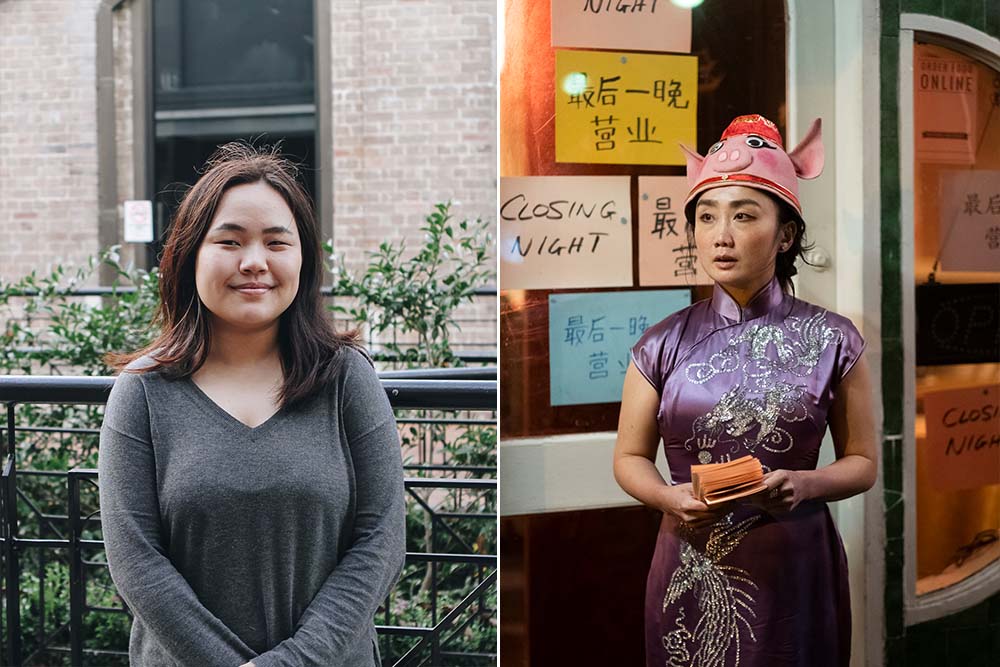 Claire Cao (Photo: Co-Curious), Closing Night (Photo credit: Bill Green)
Claire Cao (Photo: Co-Curious), Closing Night (Photo credit: Bill Green)
A writer from western Sydney, Claire’s film criticism, essays and fiction have been published in publications such as The Big Issue, Filmmaker, SBS Voices, Voiceworks, Meanjin, Kill Your Darlings and more. Claire works in Communications and Marketing at Diversity Arts Australia and is an Assistant Program Advisor for Sydney Film Festival.
What did the experience of Here Out West mean for your writing?
Here Out West was a massive learning experience as my first screen project — I learned how to work within one of the most collaborative writing environments I’ve ever experienced, where we all refined our ideas through empathy, humour and building on each other’s creativity. I also learned a lot through collaborating with the director of my section, who made me think more deeply about my storytelling aims and worldbuilding.
What was it like working with Leah Purcell in bringing your chapter Closing Night to life?
Leah Purcell, the director of Closing Night, was extremely open to my thoughts and a passionate advocate for my vision. She immediately had a strong vision of the visuals of my part (such as beautiful shots of the tablecloths in the air!) and looped into casting discussions. Even though, as an Indigenous director, Leah is from a different background to me, she deeply understood the core relationship of Closing Night due to her own family responsibilities and kinship with the women in her family.
What’s does it mean to you to see your story on cinema screens?
It’s something that still continuously amazes me! Cinemas are magic to me, as it’s a way for us to communally share the beauty and intensity of storytelling — for a film made through such a communal model, about community, it’s been so lovely seeing people react and share the film.
Watch Here Out West at cinemas now.

What to read next
Cooked co-writer/director Jake Duczynski on his journey from aspiring tattoo artist to now, and his goal to upskill the next generation of First Nations animators.
07 Jul 2021
Caris Bizzaca